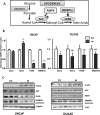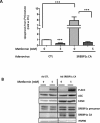Metformin-induced energy deficiency leads to the inhibition of lipogenesis in prostate cancer cells
- PMID: 26002551
- PMCID: PMC4558177
- DOI: 10.18632/oncotarget.3404
Metformin-induced energy deficiency leads to the inhibition of lipogenesis in prostate cancer cells
Abstract
The deregulation of lipid metabolism is a hallmark of tumor cells, and elevated lipogenesis has been reported in prostate cancer. Metformin, a drug commonly prescribed for type II diabetes, displays antitumor properties. Here, we show that metformin inhibits lipogenesis in several prostate cancer cell lines. In LNCaP cells, this effect parallels the decrease of key lipogenic proteins: ACC (acetyl-CoA carboxylase), FASN (fatty acid synthase) and SREBP1c (sterol regulatory element binding protein-1c), whereas there is no modification in DU145 and PC3 cells. Despite the relatively high level of lipogenic proteins induced by the overexpression of a constitutively active form of SREBP1c or treatment with androgens, metformin is still able to inhibit lipogenesis. Metformin does not alter the concentration of malonyl-CoA (the fatty acid precursor), and it only slightly decreases the NADPH levels, which is a co-factor required for lipogenesis, in LNCaP. Finally, we show that the inhibitory effect of metformin on lipogenesis is primarily due to a cellular energy deficit. Metformin decreases ATP in a dose-dependent manner, and this diminution is significantly correlated with the inhibition of lipogenesis in LNCaP and DU145. Indeed, the effect of metformin is linked to changes in the ATP content rather than the regulation of protein expression. Our results describe a new mechanism of action for metformin on prostate cancer metabolism.
Keywords: ATP; cancer metabolism; lipogenesis; metformin; prostate cancer.
Figures






Similar articles
-
Salicylate activates AMPK and synergizes with metformin to reduce the survival of prostate and lung cancer cells ex vivo through inhibition of de novo lipogenesis.Biochem J. 2015 Jul 15;469(2):177-87. doi: 10.1042/BJ20150122. Epub 2015 May 5. Biochem J. 2015. PMID: 25940306
-
Inhibition of lipogenesis and induction of apoptosis by valproic acid in prostate cancer cells via the C/EBPα/SREBP-1 pathway.Acta Biochim Biophys Sin (Shanghai). 2021 Mar 2;53(3):354-364. doi: 10.1093/abbs/gmab002. Acta Biochim Biophys Sin (Shanghai). 2021. PMID: 33471067
-
RNA interference-mediated silencing of the acetyl-CoA-carboxylase-alpha gene induces growth inhibition and apoptosis of prostate cancer cells.Cancer Res. 2005 Aug 1;65(15):6719-25. doi: 10.1158/0008-5472.CAN-05-0571. Cancer Res. 2005. PMID: 16061653
-
Androgens, lipogenesis and prostate cancer.J Steroid Biochem Mol Biol. 2004 Nov;92(4):273-9. doi: 10.1016/j.jsbmb.2004.10.013. Epub 2004 Dec 19. J Steroid Biochem Mol Biol. 2004. PMID: 15663990 Review.
-
The mitochondrial H(+)-ATP synthase and the lipogenic switch: new core components of metabolic reprogramming in induced pluripotent stem (iPS) cells.Cell Cycle. 2013 Jan 15;12(2):207-18. doi: 10.4161/cc.23352. Epub 2012 Jan 15. Cell Cycle. 2013. PMID: 23287468 Free PMC article. Review.
Cited by
-
Deletion of PRKAA triggers mitochondrial fission by inhibiting the autophagy-dependent degradation of DNM1L.Autophagy. 2017 Feb;13(2):404-422. doi: 10.1080/15548627.2016.1263776. Epub 2017 Jan 13. Autophagy. 2017. PMID: 28085543 Free PMC article.
-
Preventative and Therapeutic Effects of Metformin in Gastric Cancer: A New Contribution of an Old Friend.Cancer Manag Res. 2020 Sep 16;12:8545-8554. doi: 10.2147/CMAR.S264032. eCollection 2020. Cancer Manag Res. 2020. PMID: 32982447 Free PMC article. Review.
-
LXRs, SHP, and FXR in Prostate Cancer: Enemies or Ménage à Quatre With AR?Nucl Recept Signal. 2018 Oct 16;15:1550762918801070. doi: 10.1177/1550762918801070. eCollection 2018. Nucl Recept Signal. 2018. PMID: 30718981 Free PMC article. Review.
-
Nanomedicine-Enabled Modulation of Tumor Hypoxic Microenvironment for Enhanced Cancer Therapy.Adv Ther (Weinh). 2020 Jan;3(1):1900083. doi: 10.1002/adtp.201900083. Epub 2019 Sep 30. Adv Ther (Weinh). 2020. PMID: 34277929 Free PMC article.
-
Recent Research on Methods to Improve Tumor Hypoxia Environment.Oxid Med Cell Longev. 2020 Dec 2;2020:5721258. doi: 10.1155/2020/5721258. eCollection 2020. Oxid Med Cell Longev. 2020. PMID: 33343807 Free PMC article. Review.
References
-
- Tannock IF, de Wit R, Berry WR, Horti J, Pluzanska A, Chi KN, Oudard S, Theodore C, James ND, Turesson I, Rosenthal MA, Eisenberger MA. Docetaxel plus prednisone or mitoxantrone plus prednisone for advanced prostate cancer. N Engl J Med. 2004;351:1502–1512. - PubMed
-
- Menendez JA, Quirantes-Pine R, Rodriguez-Gallego E, Cufi S, Corominas-Faja B, Cuyas E, Bosch-Barrera J, Martin-Castillo B, Segura-Carretero A, Joven J. Oncobiguanides: Paracelsus' law and nonconventional routes for administering diabetobiguanides for cancer treatment. Oncotarget. 2014;5:2344–2348. - PMC - PubMed
Publication types
MeSH terms
Substances
LinkOut - more resources
Full Text Sources
Other Literature Sources
Medical
Miscellaneous

